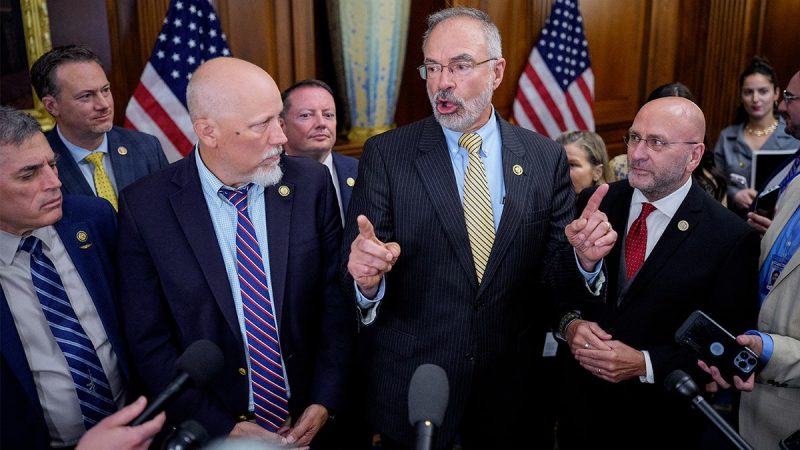
President Donald Trump signed an executive order to formally lift all sanctions on Syria on Monday afternoon.
‘The United States is committed to supporting a Syria that is stable, unified, and at peace with itself and its neighbors,’ the order stated, while directing the secretaries of State, Commerce and Treasury to relieve sanctions and waive export controls.
‘This is in an effort to promote and support the country’s path to stability and peace. The order will remove sanctions on Syria while maintaining sanctions on the former president Assad or his associates, human rights abusers, drug traffickers, persons linked to chemical weapons activities, ISIS and their affiliates, and Iranian proxies,’ White House press secretary Karoline Leavitt told reporters.
Trump is ‘committed to supporting a Syria that is stable, unified and at peace with itself and its neighbors,’ Leavitt said.
Ambassador Tom Barrack, Trump’s envoy to Syria, called the new order a ‘tedious, detailed, excruciating process’ of unraveling the sanctions that had been in place for decades on the regime of Bashar al-Assad, who oversaw a nation at civil war for more than a decade.
Brad Smith, the Treasury Department’s undersecretary for terrorism and financial intelligence, said sanctions would remain ‘where appropriate,’ including on Assad and his associates and any other destabilizing regional actors.
Smith said the fall of Assad represented a ‘new beginning’ for the Syrian people and Trump had decided U.S. sanctions ‘would not stand in the way of what could be a brighter future for the country.’
But he warned: ‘The United States will remain ever vigilant where our interests and security are threatened, and Treasury will not hesitate to use our authorities to protect us and international financial systems.’
Some sanctions will still need to be lifted by Congress, and others date to 1979, when Syria was designated a state sponsor of terrorism. The administration has not yet lifted that designation.
Trump met last month with Syria’s new interim leader, Ahmed al-Sharaa, during a Middle East visit.
From having a $10 million bounty on his head to sitting down with the U.S. president, the turnaround of the Syrian leader has been remarkable.
Al-Sharaa’s group Hay’at Tahrir al-Sham (HTS), a Syrian militant organization founded as an offshoot of al Qaeda, overthrew Assad in March.
Al-Sharaa had been campaigning hard for a relationship with Washington and sanctions relief: he offered to build a Trump Tower in Damascus, détente with Israel, and U.S. access to Syria’s oil and gas. He worked to soften the image of HTS and promised an inclusive governing structure.
U.S. sanctions have included financial penalties on any foreign individual or company that provided material support to the Syrian government and prohibited anyone in the U.S. from dealing in any Syrian entity, including oil and gas. Syrian banks also were effectively cut off from global financial systems.
The new order comes as Israeli and Syrian officials are engaged in back-channel talks on a potential security and normalization deal.
Israel and Syria have long been foes, and some Israeli officials worry that lifting all sanctions on Syria means giving up ‘leverage’ to pressure them into a deal to normalize ties with Israel.
To that point, one senior administration official shot back: ‘We have consistently said we’re not nation-building. It’s to Syria’s benefit to lean toward Israel.’
‘The president ripped off the sanctions without any preconditions,’ the official said. ‘Leverage is not what we’re interested in doing.’
War between Israel and Hamas in Gaza has complicated any movement on normalization deals between Israel and its neighbors. But the official predicted: ‘There’s going to be peace in Gaza.’

























